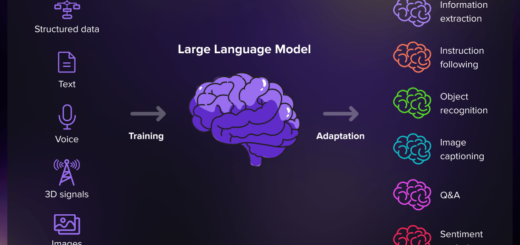The Growing Influence of AI in Strategic Thinking

For centuries, decision-making has been a deeply human endeavor—rooted in experience, intuition, and analysis. Whether in business, science, or government, the ability to make strategic choices has been seen as a uniquely human skill. However, artificial intelligence is now challenging this notion, emerging as a powerful force in shaping strategy, forecasting outcomes, and even generating entirely new ideas.
What happens when AI is no longer just a tool, but an active participant in strategic thinking? As machine learning algorithms evolve beyond simple automation, they are becoming co-creators of insights, decision frameworks, and long-term strategies. Organizations that recognize and adapt to this shift will gain an unparalleled advantage, while those that hesitate may struggle to keep pace with AI-driven competitors.
This article explores the ways AI is transforming strategic intelligence, the industries being most affected, and the challenges that come with integrating AI into high-level decision-making.
Beyond Data Analysis: AI as a Strategic Partner
Traditional AI applications have focused primarily on data processing, automation, and pattern recognition. However, the latest advancements are taking AI beyond these functions, enabling it to act as a thinking partner rather than just an analytical tool.
Some of the most impactful developments include:
- Predictive and Prescriptive Analytics: AI is no longer just identifying patterns; it is forecasting future trends and recommending optimal actions in complex situations.
- Scenario Simulation and Risk Assessment: Businesses and policymakers are using AI to model hundreds of possible outcomes, helping them plan for economic shifts, global crises, and market fluctuations.
- Decision Augmentation: AI is assisting leaders by offering context-aware recommendations and surfacing hidden variables that humans might overlook.
- Generative AI for Ideation: AI is contributing to brainstorming and creative problem-solving, producing novel business models, scientific hypotheses, and even policy frameworks.
As AI grows more sophisticated, its role in high-stakes decision-making is becoming increasingly prominent, reshaping how leaders approach complex challenges.
Industries Transforming Through AI-Driven Strategy
The impact of AI-powered strategic intelligence is being felt across multiple sectors.
1. AI in Financial and Economic Planning
- Hedge funds and investment firms are deploying AI-driven market analysis, predicting economic shifts with greater accuracy.
- Central banks are leveraging AI to simulate policy impacts, ensuring more informed decisions on interest rates and financial regulations.
- AI-powered real-time risk assessment tools are improving fraud detection, portfolio management, and credit risk evaluation.
2. AI in Business Strategy and Competitive Intelligence
- AI models are helping businesses predict competitor movements, guiding companies in mergers, acquisitions, and pricing strategies.
- Enterprise AI tools analyze consumer sentiment, purchasing patterns, and global supply chain disruptions to guide executives in high-level planning.
- AI-driven innovation platforms are assisting companies in identifying new product opportunities and emerging markets before human analysts can.
3. AI in Scientific Discovery and Research Innovation
- AI is accelerating drug discovery and materials science, helping researchers navigate massive datasets and simulate experiments before real-world testing.
- Scientists are using AI to generate new research questions, automating the hypothesis-generation process in fields like physics and biology.
- AI-driven automation in R&D labs is improving efficiency, shortening the cycle from discovery to application.
4. AI in Government and Policy Planning
- AI models are assisting governments in urban planning, infrastructure investment, and climate resilience strategies.
- Machine learning is being used to predict geopolitical risks, helping policymakers prepare for economic and security threats.
- AI-powered social impact simulations are guiding decision-makers in public health, poverty reduction, and disaster response efforts.
Across these sectors, AI is not just making existing processes more efficient—it is actively shaping the future of strategic thinking.
Challenges of AI in Strategic Decision-Making
Despite its potential, AI’s integration into strategic thinking is not without obstacles.
1. The Black Box Problem
- Many advanced AI models, particularly deep learning systems, operate as black boxes, making their decision-making processes difficult to interpret.
- Leaders and policymakers need AI systems that offer transparency and explainability, ensuring that decisions can be justified and trusted.
2. Over-Reliance on AI Recommendations
- As AI becomes more embedded in decision-making, there is a risk that human judgment and critical thinking may be undervalued.
- Organizations must strike a balance between AI-driven insights and human expertise, ensuring that decisions are made with ethical and strategic oversight.
3. Ethical and Bias Concerns
- AI systems trained on biased datasets can amplify existing inequalities, especially in areas like finance, hiring, and criminal justice.
- AI governance frameworks must ensure fairness, accountability, and non-discriminatory outcomes.
4. The Security Risks of AI in Decision-Making
- AI-driven strategic tools can be vulnerable to data manipulation, adversarial attacks, and misinformation campaigns.
- Companies and governments must invest in robust cybersecurity and AI integrity measures to prevent misuse.
Successfully addressing these challenges will be key to unlocking AI’s full potential as a strategic intelligence tool.
The Future of AI-Driven Strategic Thinking
Looking ahead, the role of AI in high-level decision-making will continue to expand. Some of the major developments on the horizon include:
- AI-Augmented Leadership: Executives and policymakers will have AI-powered advisory systems, offering real-time insights and counterfactual analysis.
- Automated Strategic Planning Models: AI will generate entire business plans and policy proposals, helping organizations move faster from strategy to execution.
- AI-Enabled Crisis Simulations: Governments and enterprises will use AI to run complex what-if scenarios, preparing for economic shocks, cybersecurity threats, and supply chain disruptions.
- Neurosymbolic AI for Reasoning and Judgment: Combining deep learning with symbolic reasoning will create AI systems capable of logical, transparent decision-making.
These advancements will push AI beyond mere analytics, turning it into a true strategic partner in decision-making at the highest levels.
Final Thoughts: AI as an Evolutionary Step in Strategy
The integration of AI into strategic intelligence is not just an incremental improvement—it is a fundamental shift in how decisions are made. By enhancing human reasoning, anticipating future challenges, and proposing novel solutions, AI is becoming an indispensable force in leadership, business, and innovation.
However, the true power of AI lies not in replacing human decision-makers, but in augmenting their ability to think critically, creatively, and strategically. Organizations that successfully integrate AI into their decision-making processes—while maintaining ethical oversight and human intuition—will be the ones that lead in an increasingly AI-driven world.
The future belongs to those who can think alongside AI, not just use it as a tool.




